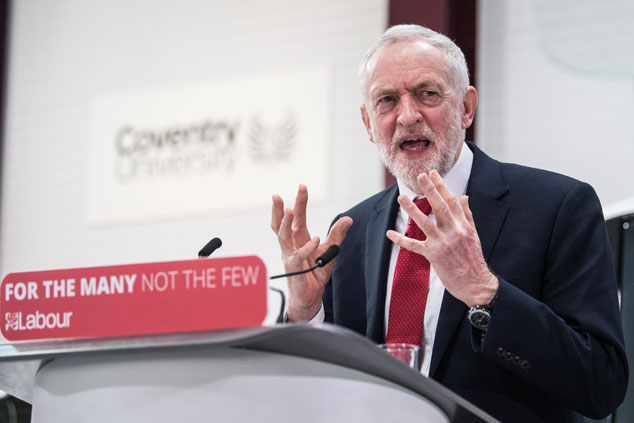
The Labour leader has made himself sound more pro-business than the Tories. Emily Hohler reports.
During her Lancaster House speech a year ago, Theresa May kept open the option of membership of a post-Brexit customs union with the European Union, says the Evening Standard. Last Thursday, it was “formally closed” and on Monday Jeremy Corbyn “kicked the ball into the back” of this open goal, declaring Labour’s support for one. In doing so, the Labour leader has “manoeuvred himself into a more pro-business, pro-free-trade European policy than the Tory government”.
Keeping the customs union would ensure the continuation of tariff-free trade with our largest single export market, “largely resolve” the contentious issue of the Irish border, and allow Britain to remain part of existing EU trade deals and be included in any future ones.
Boris under fire
So why did the Tories rule out a customs union? Theresa May’s official spokesman said it was because “we want to have the freedom to sign our own trade deals and to reach out to the world”, reports Benjamin Kentish in The Independent. Boris Johnson concurred, says the BBC, and dismissed concerns over the Irish border, suggesting – to widespread derision – that the issue could be solved with technology in much the same way as the London congestion charge was implemented on the boundary of Camden and Westminster.
Other senior Brexiteers weighed in on Corbyn’s plan, say James Randerson and Charlie Cooper in Politico, with Jacob Rees-Mogg pointing out that “staying in a customs union does not automatically remove the border (in Northern Ireland). Turkey still has a policed customs border while in a customs union with the EU.” Meanwhile, Liam Fox, the international trade secretary, said any form of customs union would be a “complete sell-out” and leave the UK as “rule takers”, says Jessica Elgot in The Guardian.
An illusory deal
Corbyn’s “thoroughly illusory post-Brexit deal” doesn’t really stack up, says Anne McElvoy in the Evening Standard. It was a “jumbled mix of a Delorsian ‘social Europe’ – state aid and special deals for threatened industries – a Turkish arms-length relationship and something to do with Switzerland”. The Irish border element exploited May’s “paralysis”, but in reality, the border could only be truly open if there is full alignment, not a selective customs union, because there would still be time-consuming border checks”.
As for the “plaintive pledge” of a say in future trade deals, we wouldn’t have one. However, none of this really matters. The point of the exercise is to put the Tories – and May’s leadership – under pressure, while “deferring the point at which its own nonsense comes under scrutiny”.
Corbyn may be trying to “undermine the prime minister” and his demands “are unrealistic”, says the Financial Times, but his move could “ultimately serve the national interest”. The “broader point is that Britain’s political discourse has become warped”, with Corbyn, an “unreconstructed socialist”, speaking “more to the needs of the British economy” than May’s traditionally pro-business Tory party.
At some point in the near future, the Commons will vote on an amendment to the trade bill about remaining part of a customs union. Britain should maintain one in the interests of the economy. “A solution might be possible if the UK came up with a new kind of customs union.” If she doesn’t “change tack, Tory MPs should work with Labour to make it happen”.
Barnier turns the screws on May
The European Commission has “turned the screws” on Theresa May in an attempt to force her to “cave in on Brussels’ red lines over the Irish border” and finally provide some details on Britain’s post-Brexit relationship with the EU in her flagship speech this Friday, says James Crisp in The Daily Telegraph. On Wednesday, Michel Barnier, the EU’s chief Brexit negotiator, published an “explosive” 120-page legal draft of the withdrawal agreement, translating into “bureaucratic, binding language” the joint report agreed by the EU and the UK last December.
The “default option”, in the event that no deal can be agreed between the UK and EU, is a “common regulatory area” on the island of Ireland, implying that Northern Ireland would “effectively” remain inside the EU customs union and single market, says James Tapsfield in the Daily Mail. The European Court of Justice would have the power to “interpret and enforce” the agreement.
Furious Brexiteers accused Brussels of attempting to “annexe” Northern Ireland. Boris Johnson said it was using the Irish border issue to “force the whole of the UK to stay in the customs union”. Downing Street’s response was robust. May says she will not agree to anything that “threatens the constitutional integrity of the UK”, and that she wanted the draft withdrawal agreement rewritten, says the Irish News. Nor, a Downing Street source added, “are we going to accept the ECJ as the final arbiter”.
Yet it’s unlikely that May’s Friday speech will provide a coherent way forward. Eighteen months into Brexit, “take back control” has become “managed divergence”, says Janan Ganesh in the Financial Times. May’s new “three baskets” approach “sounds like a pub and contains as much lucid thought”, with the three baskets binding different industries to single-market rules to varying degrees. European Council president Donald Tusk pre-emptively dismissed the plan as “pure illusion”, commenting, “It looks like the cake philosophy is still alive”.